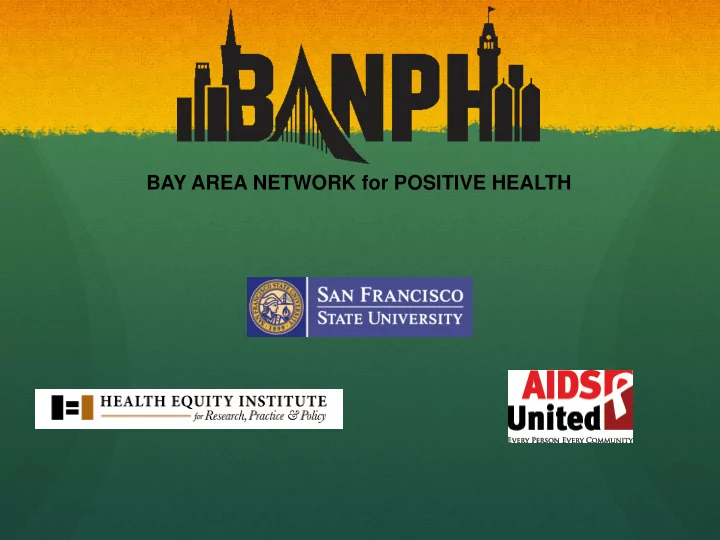

BAY AREA NETWORK for POSITIVE HEALTH
Access to HIV Care An Assessment of Peer Navigation for HIV+ African American Men in Oakland Outcomes of Two Focus Groups Presented by: Nicholas Alvarado & Maurice Graham
Objectives To learn what the barriers and facilitators are in seeking and maintaining HIV care among HIV+ African American men in Oakland, with an emphasis on Men who have Sex with Men, (MSM). To obtain feedback on whether a male peer navigator program would be effective in linking HIV+ African American men into care, in Oakland and the East Bay.
The Problem African Americans make up just 11% of Oakland Transitional Grant Area (O - TGA) Alameda and Contra Costa Counties, but they make up 42% of HIV infections and 43.2% of AIDS diagnosis. 1 Men who have sex with men (MSM) continues to be the highest HIV exposure category. 1 From 2006 – 2009 new HIV infections among young black MSM in the US, (13 – 29) increased by 48%. 2 Distrust and stigma are found to be barriers around HIV disclosure among African American men, which may impact their ability to access HIV care. 3
Three Questions What are some reasons these HIV+ men are not accessing care or not receiving adequate care? What would help these men access HIV care and keep them involved in their care? What could make a peer navigator program successful for HIV+ African American men in Oakland?
Three Main Themes Stigma Around Sex and HIV from Family, Friends, Work and Church The Expectation of Inadequate Care HIV Education and Resources
Addressing Barriers Through Peer Navigation Stigma Around Stigma around Sex & HIV Sex & HIV Peer Navigation Training Resources A Peer Outreach Navigation Model Education Support & empowerment Build trust, respect & healthy relationships Expectation of Inadequate Care
In Conclusion Participants appreciated the focus group involvement There were a few men who were skeptical and not sure such a model would work Both groups felt stigma and trust were major barriers to care Genuine support, respect, and meeting the client where he is, were reported as critical for effective care Further exploration is needed
Recommend
More recommend